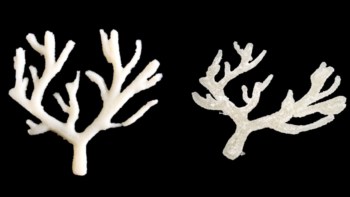
Researchers in Singapore have investigated the use of mesenchymal stem cell (MSC) exosomes to improve cartilage regeneration. They observed an increase in cartilage cell proliferation and infiltration, enhanced matrix synthesis, and an immunologic response matching with an appropriate healing mechanism (Biomaterials 156 16).
Cartilage repair is a challenging issue due to the poor intrinsic regenerative capacity of cartilage and the fibrous tissue formation (fibroblast proliferation) that results from injury. MSC therapy has shown great promise in addressing both of these problems. However, several papers have reported that the beneficial effects of MSC rely on a paracrine secretion mechanism (in which cells synthesize molecules that they then secrete), rather than MSC differentiation into cartilage cells (chondrocytes), as first hypothesized.
Among these secreted paracrine factors, increasing attention has been given to extracellular vesicles, particularly the exosomes. Endogenously formed by almost every cell, exosomes are a type of extracellular vesicle that play an important role in cell-to-cell communication. Exosomes contain complex cargo components including proteins, RNA, microRNA, DNA and lipids. MSC exosomes are postulated to be the mediator of MSCs in tissue repair as they deliver biomolecules with immunomodulatory and regenerative capacity.
Wei Seong Toh and his team at the National University of Singapore reported the mechanism underlying exosome-mediated cartilage regeneration of a damaged femur in rats with functional immune systems. The regeneration process is composed of multiple aspects, each of which was studied by the researchers. They reported encouraging results for both the gross appearance and histological analysis using this treatment compared with the control, phosphate buffered saline solution.
Chondrocyte proliferation
Following injection of the MSC exosomes, the chondrocytes rapidly transported the exosomes into the cell, where they localized in the cytoplasm. Chondrocyte proliferation, metabolism and migration were enhanced in a dose-dependent manner.

Exosome treatment also increased cartilage extracellular matrix (ECM) components: collagen type II and sulphated glycosaminoglycan (s-GAG), indicating an enhanced matrix synthesis. This finding, combined with the increased expression of mRNA levels of cartilage matrix protein (COMP) and chondrogenic factor TGF-β1, confirms the capacity of those exosomes to maintain the chondrocyte phenotype, for an optimal cartilage healing.
Favourable immune response
Immune response is an important aspect in the regeneration process. Macrophages (white blood cells) play key roles in healing. M1 macrophages exhibit an inflammatory response, which jeopardizes the healing process, while M2 macrophages are associated to anti-inflammatory response. In this study, the team observed an increase of M2 macrophages and a decrease of M1 macrophages in both cartilage and synovial tissues (connective tissue between the cartilage and tendon), suggesting that healing is promoted by restraining inflammation.

This multi-parameter study confirms the potential of MSC exosomes for cartilage regeneration and suggests great promise for this clinical application, which is also under consideration for treatment of other disorders.



